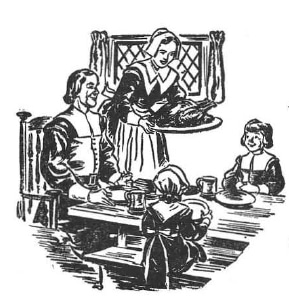Thanksgiving day finds us this year with many things for which we ought to be thankful and yet there often seems to be so little of true thanksgiving. This is due, surely, to the fact that genuine gratitude is something difficult to achieve. One would suppose that if such gratitude is to be found anywhere it would be in the church of Jesus Christ. Here too, however, it is often found to be lacking.
The lack of true thanksgiving and the difficulty in achieving it is well illustrated by the history of the Old Testament church. Israel was found under the leadership of Moses in the wilderness of Sin. They were, indeed, a disgruntled people. “Ye have brought us forth into this wilderness, to kill this whole assembly with hunger.”
In Egypt things were far different. There, at least, the flesh pots were full and the water pitchers were supplied. By the work of their own hands the Israelites were able to satisfy their wants. But in the wilderness the opportunities to supply their daily need of food and drink were gone and the men of Israel despaired.
This sin of divorcing our daily bread from God is a great danger for us today. Daily bread is gained in the arena of economic activity and struggle and in this place God seems to be of little practical consequence.
The complexity of our modern world, with all the factors of supply and demand, prices and wages, parities and land banks, processing and distribution, cellophane wrappers and tin cans, easily drives an ever deeper wedge between God and our daily bread. And what God has joined together is by man, consciously or unconsciously, put asunder.
In such a frame of mind hue thanksgiving is impossible. We may still have a Thanksgiving Day but its essential character is lost since true gratitude is essentially a person-toPerson relation. How often do we pray, “Give us this day our daily bread,” and mean what we pray?
When in their anxiety the people of Israel murmured and complained against Moses and against God, the Lord taught them a most difficult lesson. Moses said to them: “At even, then shall ye know that Jehovah hath brought you out from the land of Egypt.” He is your God who brought you out of the house of bondage. He is the God of your salvation. He is your Redeemer. He is your Father and ye are his children. Open your mouths wide and he will fill it. But be ye not faithless but believing.
Then the manna came each day and God sent quails in the evening and Israel came to understand that they lived each day out of the hand of Jehovah.
Israel’s self-sufficiency finally led to despair; but God, who is rich in mercy for his great love wherewith he loves his people, taught them a most difficult lesson in a unique way. God’s people must learn to walk in the way of dependence, thanksgiving, and service.

Israel was the church of the Old Testament. True thanksgiving can be found only in the church, but if it be lacking there, how great is the nation’s ingratitude!
Two men were sitting together on Thanksgiving Day enjoying a second cup of coffee after a satisfying meal They were discussing the good things of life which they could each enjoy. The one spoke at length about the value of economic controls, union membership and power, improved distribution factors, advancements in technology and knowledge, and he concluded by saying, “All in all, we’ve done pretty well for ourselves.”
The second looked thoughtfully at the floor and acknowledged that all these factors were certainly involved in the obtaining of the good things of life. But then, at the end of the discussion he looked squarely at his companion and said, “My Father in he.wen has given us more than we deserve. We should consider carefully how we use the abundance which he has given us.”
The first man shrugged his shoulder and walked away; the second bowed his head and gave thanks.
